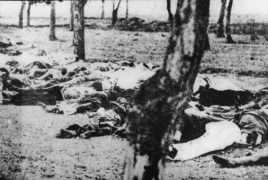In the Ruins: book on Armenian massacre tackles human rights issues December 8, 2015 - 17:13 AMT PanARMENIAN.Net - The Armenian International Women's Association (AIWA) Press announced on December 1 the publication of the first full-length English translation of “In the Ruins,” written by 20th century female author and activist Zabel Yessayan. A first-hand account of the aftermath of the 1909 Turkish massacre of 30,000 Armenians, the volume is a must-read for those who want to understand the struggle for human rights in the Ottoman Empire at the turn of the 20th century and the backdrop to today’s political climate and events in Syria, Iraq and Turkey. The official publication date will be March 8, 2016, coinciding with the 2016 celebration of International Women’s Day. At age 31, Yessayan journeyed to the scene of the 1909 massacres of Armenians in Adana to provide relief for the victims and to observe conditions. She returned to Constantinople (Istanbul) and penned “In the Ruins,” which heralded a new literary form. A literature of testimony, Yessayan documents the voices of the survivors who tell her their horrific stories and describe their emotional turmoil and terror. From her earliest years, Zabel Yessayan championed social justice and women’s rights. Even as a young woman, she fought against the injustices she saw at school, refused to accept the restrictions placed on girls in her community and demonstrated a fierce determination to succeed in the literary world at a time when few women were allowed entry. In addition to In the Ruins, she authored several novels, short stories, newspaper articles and a memoir. The Armenian International Women’s Association (AIWA) previously released two other books in English translation by Zabel Yessayan: The Gardens of Silihdar, a memoir of Yessayan’s childhood in the city of Constantinople and My Soul in Exile and Other Writings, a collection which highlights her novel about an artist who returns home to the Ottoman capital where she confronts feelings of alienation and isolation. These three Yessayan volumes contain some of her best and most influential works and provide a picture of the scope, breath and historical significance of her writing. The Yessayan books are the latest releases in AIWA’s “Treasury of Armenian Women’s Literature” series, which makes available English-language translations of works by pioneering women authors who wrote in Eastern or Western Armenian. The translation and publication of “In the Ruins” was made possible by a generous grant from the Gulbenkian Foundation, and the book includes an appendix with selected articles and letters by Yessayan that elucidate the events of 1909 and their immediate aftermath.  The Armenian Genocide The Armenian Genocide (1915-23) was the deliberate and systematic destruction of the Armenian population of the Ottoman Empire during and just after World War I. It was characterized by massacres and deportations, involving forced marches under conditions designed to lead to the death of the deportees, with the total number of deaths reaching 1.5 million. The EU does not intend to conduct military exercises with Armenia, Lead Spokesperson for EU Foreign Affairs and Security Policy Peter Stano says. A telephone conversation between Putin and Pashinyan before the CSTO summit is not planned, Peskov says. London’s Armenian community has been left feeling “under attack” after the city’s Genocide monument was vandalised. The United States believes there should be an international mission to provide transparency. Partner news |